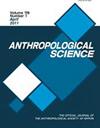Forelimb long bones of Nacholapithecus (KNM-BG 35250) from the middle Miocene in Nachola, northern Kenya
IF 0.8
4区 社会学
Q3 EVOLUTIONARY BIOLOGY
引用次数: 8
Abstract
This paper provides a thorough description of humeral, ulnar, and radial specimens of the Nacholapithecus holotype (KNM-BG 35250). A spool-shaped humeral trochlea (and keeled sigmoid notch of the ulna) is a hallmark of elbow joint evolution in hominoids. In lacking this feature, the elbow of Nacholapithecus is comparatively primitive, resembling that of proconsulids. However, the humeroulnar joint in Nacholapithecus is specialized for higher stability than that in proconsulids. The humeroradial joint (humeral capitulum) resembles that of extant apes and Sivapithecus. This condition may represent an intermediate stage leading to the fully modern elbow in extant apes. If this is the case, specialization of the humeroradial joint preceded that of the humeroulnar joint. Nacholapithecus elbow joint morphology suggests more enhanced forearm rotation compared to proconsulids. This observation accords with the forelimb-dominated positional behavior of Nacholapithecus relative to proconsulids, which has been proposed on the grounds of limb proportions and the morphology of the phalanges, shoulder girdle, and vertebrae.肯尼亚北部Nachola中新世中期Nacholapithecus (KNM-BG 35250)前肢长骨
本文提供了完整的Nacholapithecus (KNM-BG 35250)的肱骨、尺骨和桡骨标本的描述。线轴形肱骨滑车(以及尺骨的龙骨状乙状切迹)是类人猿肘关节进化的标志。由于缺乏这一特征,Nacholapithecus的肘部比较原始,类似于原柱头类。然而,相较于前会骨,Nacholapithecus的肱骨尺关节具有更高的稳定性。肱骨关节(肱骨头)类似于现存的类人猿和猿类。这种情况可能代表了导致现存猿类完全现代肘部的中间阶段。如果是这种情况,肱骨关节的特化先于肱骨尺关节。Nacholapithecus肘关节形态提示与前会骨相比前臂旋转更强。这一观察结果与Nacholapithecus相对于原乳突动物的前肢主导的位置行为相一致,这是基于肢体比例和指骨、肩带和椎骨的形态而提出的。
本文章由计算机程序翻译,如有差异,请以英文原文为准。
求助全文
约1分钟内获得全文
求助全文
来源期刊

Anthropological Science
生物-进化生物学
CiteScore
1.50
自引率
0.00%
发文量
7
审稿时长
>12 weeks
期刊介绍:
Anthropological Science (AS) publishes research papers, review articles, brief communications, and material reports in physical anthropology and related disciplines. The scope of AS encompasses all aspects of human and primate evolution and variation. We welcome research papers in molecular and morphological variation and evolution, genetics and population biology, growth and development, biomechanics, anatomy and physiology, ecology and behavioral biology, osteoarcheology and prehistory, and other disciplines relating to the understanding of human evolution and the biology of the human condition.
 求助内容:
求助内容: 应助结果提醒方式:
应助结果提醒方式:


